EJI Ink Fall 2017 Newsletter
Director's Welcome
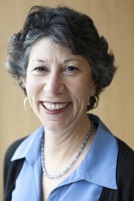 By Marsha Mansfield, Distinguished Clinical Professor of Law Director, Economic Justice Institute
By Marsha Mansfield, Distinguished Clinical Professor of Law Director, Economic Justice Institute
Welcome to the fall edition of EJI Ink. Our year is off to an exciting start with many activities in which I hope you participated. October 20 was Homecoming Weekend and the Law School’s All-Class Reunion. The weekend’s events began with a social event on Thursday evening where many EJI alums enjoyed cocktails and conversation at Murphy Desmond. We were happy to have Louise Trubek, Emerita Clinical Professor, and founder of the Center for Public Representation, EJI”s predecessor organization, attend. Louise also made a presentation at the All-Class Reunion’s kick off event - a luncheon CLE about the history of the Center for Public Representation (CPR)
The Wisconsin Law Review Symposium topic this year was: "Public Interest Mobilization and Access to Justice Movements in the New Democratic State." The one-day symposium explored the role of public interest law organizations in ensuring a strong democracy and civil society; examined cutting-edge empirical research in the access to justice field; and fostered discussion and collaboration among academics, advocates, and public interest leaders.
If you are inclined to pursue an activity from the comfort of your own home, we invite you to learn more about one of our current EJI students. Visit the Law School’s home page and meet Will Kramer, a student in the Neighborhood Law Clinic.
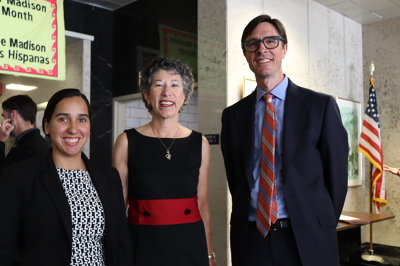 As you probably already know, our Immigrant Justice Clinic has been busy with outreach efforts to educate the community about DACA and to make sure that everyone who is able could register before the deadline imposed by the government. This outreach effort was a collaboration among all of the Dane County agencies who serve our immigrant communities and we are proud to be part of the team. This collaboration also allowed the IJC to participate in obtaining a grant from the Vera Institute to provide legal services to detained individuals with ties to Dane County. Dane County was chosen as one of twelve jurisdictions to be part of the Vera Institute of Justice’s national initiative called the Safety and Fairness for Everyone (SAFE) Cities Network. The Vera Institute of Justice awarded $100,000 to two area legal service providers: Immigrant Justice Clinic at the UW-Law School and Community Immigration Law Center (CILC). Dane County worked closely with the Immigration Coalition to compete for this national funding in order to ensure legal representation for those whose future may well depend on it.
As you probably already know, our Immigrant Justice Clinic has been busy with outreach efforts to educate the community about DACA and to make sure that everyone who is able could register before the deadline imposed by the government. This outreach effort was a collaboration among all of the Dane County agencies who serve our immigrant communities and we are proud to be part of the team. This collaboration also allowed the IJC to participate in obtaining a grant from the Vera Institute to provide legal services to detained individuals with ties to Dane County. Dane County was chosen as one of twelve jurisdictions to be part of the Vera Institute of Justice’s national initiative called the Safety and Fairness for Everyone (SAFE) Cities Network. The Vera Institute of Justice awarded $100,000 to two area legal service providers: Immigrant Justice Clinic at the UW-Law School and Community Immigration Law Center (CILC). Dane County worked closely with the Immigration Coalition to compete for this national funding in order to ensure legal representation for those whose future may well depend on it.
You too can commit to making access to justice a reality for all. Please consider a donation today. Our work would not be possible without your generous support.
Faculty Updates and News
- In April, Mitch was named a 2017 Race-Equity fellow and attended the week-long Racial Justice Training Institute hosted by the National Shriver Center in Chicago on Poverty Lines.
- In May, Sarah led a workshop about clinic “rounds” at the inaugural biannual Consumer Law Clinic conference at UC-Berkley Law School.
- In May the NLC students and Mitch successfully litigated a five-day jury trial on a wage theft case, recovering both maximum compensatory and exemplary damages.
- In June, Ben was a panelist at the 2017 Wisconsin State Bar Annual Meeting and Conference in Wisconsin Dells. The panel topic was "The Reality Behind the U.S. Refugee & Asylee Admissions Process".
- In June, Mitch was interviewed on Wisconsin Public Radio regarding a rental housing rent-to-own scam affecting over 200 homes which the State Department of Justice is now prosecuting.
- In July, Mitch presented the updated UW-Extension course, "Rent Smart" to social workers from all around Wisconsin.
- In September, Mitch gave a presentation about rental housing laws at the monthly Paralegal Association of Wisconsin meeting.
Sophie, Amos, & Real Inspiring Rebels
By Mitch, Director of the Neighborhood Law Clinic
New students in each class of the Neighborhood Law Clinic (NLC) have long been assigned the first chapter of Gerald Lopez’s seminal book: "Rebellious Lawyering, One Chicano’s Vision of Progressive Law Practice". The chapter details the stories of a fictional law student named Catharine, who interns for three, traditional progressive law firms. One is an impact litigation firm run by Teresa, another is an employment law firm run by Abe, and the last traditional firm is a legal aid organization run by Jonathon. The chapter closes by introducing two so-called “rebellious” lawyer-characters, Sophie and Amos. Every year when the chapter is discussed, one critique is that the non-traditional practices of Sophie and Amos are not very well-defined. Instead of focusing on the structure and nature of Sophie and Amos, the chapter examines the difficulties that confront attorneys who practice at traditional firms similar to that of the fictional Teresa, Abe, and Jonathon. While reading the chapter, students are asked to apply a funding-critique or lens to the fictional characters, and in so doing, students begin to realize and understand the important influence that funding sources create for lawyers.
 Meanwhile, the rebellious Sophie and Amos are doing things differently. But how, exactly? And where does their funding come from? Students want to know. In a legal system based on precedent, is it even possible to successfully practice law in a way that differs from the predominant traditional methods? Some might say that Lopez was wise to limit detail about Sophie and Amos because that invites his readers to create and define rebelliousness in their own professional careers. One example of a former clinic student defining rebelliousness is the work of Community Justice Incorporated, a law firm that some former NLC and CLC students created over a dozen years ago. Recently, I published an article which describes sliding-scale law firms in the "NYU Journal of Legislation and Public Policy." As detailed in the article, there are dozens of nonprofit sliding-scale law firms around the country where lawyers have created firms that address many of the traditional issues Lopez identified. Nonprofit sliding-scale law firms are funded by clients, and therefore are not beholden to political whims or a donor’s wishes in contrast to traditional and government-funded nonprofits.
Meanwhile, the rebellious Sophie and Amos are doing things differently. But how, exactly? And where does their funding come from? Students want to know. In a legal system based on precedent, is it even possible to successfully practice law in a way that differs from the predominant traditional methods? Some might say that Lopez was wise to limit detail about Sophie and Amos because that invites his readers to create and define rebelliousness in their own professional careers. One example of a former clinic student defining rebelliousness is the work of Community Justice Incorporated, a law firm that some former NLC and CLC students created over a dozen years ago. Recently, I published an article which describes sliding-scale law firms in the "NYU Journal of Legislation and Public Policy." As detailed in the article, there are dozens of nonprofit sliding-scale law firms around the country where lawyers have created firms that address many of the traditional issues Lopez identified. Nonprofit sliding-scale law firms are funded by clients, and therefore are not beholden to political whims or a donor’s wishes in contrast to traditional and government-funded nonprofits.
Every year at the end of the classroom discussion on Rebellious Lawyering, students are challenged with the question: how will you have a fulfilling life and career as the progressive lawyer you want to be, while avoiding the traditional difficulties that Lopez highlights? Of course, there is no easy answer, and no single answer will work for everyone. Instead there are many--often difficult--paths that any lawyer can take. The important thing is that students can, but need not, re-invent the wheel.
Picking up where Lopez left off, the ABA Journal dedicates an annual issue featuring “Legal Rebels” to encourage and inspire others. Lawyers at nonprofit sliding-scale firms are just some of many Legal Rebels that the ABA has featured over the years. While nonprofit sliding-scale law firms might be fairly called rebellious (as opposed to traditional), they are incorrectly described as new or novel. Nothing could be further from the truth. Reginald Herber Smith described sliding-scale law firms that were started more than 100 years ago. As it turns out, the lawyers at sliding-scale firms have long been quietly increasing access to justice in a “rebellious” or non-traditional way. Kind of like Sophie and Amos, only real.
My Experience with the Consumer Law Clinic
By Reza Hajisanei, (2L)
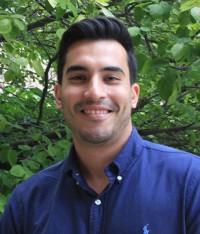 Prior to starting at the Consumer Law Clinic (CLC) this past summer, I had no clue what consumer law was. I did some research about all of the clinics at the Law School during my first semester as a 1L and heard really positive reviews about CLC’s work. I was reassured I would receive hands-on training dealing with clients and that the experience would serve me well for the future. I entered the summer with high expectations, all of which were met almost immediately.
Prior to starting at the Consumer Law Clinic (CLC) this past summer, I had no clue what consumer law was. I did some research about all of the clinics at the Law School during my first semester as a 1L and heard really positive reviews about CLC’s work. I was reassured I would receive hands-on training dealing with clients and that the experience would serve me well for the future. I entered the summer with high expectations, all of which were met almost immediately.
Throughout our orientation during the first weeks of summer, I began to reflect on economic injustice in our society. I was exposed to different issues for the first time in my life and developed an appreciation for the work of public interest advocates to protect the most vulnerable people. I became even more inspired to help those in need when I began meeting with potential clients to conduct interviews. These in-person interactions were invaluable and taught me so much from the very beginning. Meeting clients face-to-face has become my favorite part of what we do. Outside of a clinic setting, it is very rare for first year law students to get such valuable hands-on experience during their first summer. Our clinic also held weekly class sessions that focused on different topics such as debt collection, foreclosures, bankruptcy, and the Wisconsin Consumer Act. I was grateful to learn so much so quickly.
My first few months in the clinic allowed me to develop new skills and gave me the confidence to carry myself as a young professional in training. I was able to apply what I learned in the clinic during a job interview and received a dream job offer for the upcoming summer. I can confidently say that my hands-on clinic experience was very appealing to my interviewers, who were impressed with how the CLC prepares its clinical law students. Overall, I am very pleased with my time thus far with the CLC and look forward to working with my supervisor and clinical coworkers throughout the academic year.
Renting-to-Own a House Can Mean Trouble
By Vincent Falcone, (2L)
Prior to working at the Consumer Law Clinic (CLC), I didn’t truly grasp the importance of consumer protection. The phenomenon of rent-to-own housing illustrates how lives can be ruined by fraudulent practices and why consumer protection is, in fact, very important.
Renting-to-own a house works like this: A owns a house that B wants to buy, but B’s credit is not good enough to obtain a conventional loan. A tells B that B can buy the house from him by paying “rent” each month until the whole amount is paid off. In theory, once B has paid the agreed amount, A should transfer the deed to B. In many of these situations, the monthly “rent” the buyer pays is mostly interest, and the loan principal is rarely paid down.
These arrangements can spell financial ruin for buyers, who have little protection from sellers’ deceptive or fraudulent practices. Sellers often target buyers of limited resources because they know that they may have no other housing options. Frequently, the properties are in poor condition, and the buyers will agree to terms such as fixing all existing damage or disrepair in exchange for affordable monthly payments and the opportunity to own the home. But if they don’t complete the repairs, they are evicted. If they miss a rent payment, they are evicted, often after spending thousands in rent and renovations on the property.
Some states are taking action. The Wisconsin Department of Justice has filed a suit against Vision Property Management (VPM), a rent-to-own company that the WI DOJ has claimed uses “[m]isleading and deceiving business practices to induce Wisconsin consumers to lease, rent, or purchase uninhabitable properties.” Some properties had sewage in the basement and lacked basic utilities. The complaint alleges that VPM forced consumers to pay overdue property taxes, costs to rehabilitate the property, and fines from building code violations. When they cannot pay, VPM evicts them and starts over with new tenants. The Wisconsin DOJ claims this violates both Wisconsin landlord-tenant and mortgage banking laws.
Companies like these are a prime example of why we need consumer protection. If five months ago someone had asked me why consumer protection was important, I would have responded, “So people don’t get taken advantage of.” Now, if someone asks me that same question, I will respond, “So people’s lives aren’t ruined.”
The FCC: Receiving the Unexpected
By Domonic A. Burke, (2L)
Law in Action. It’s a phrase that any student, alumnus, or friend of the University of Wisconsin Law School, has heard more times than they can count. It is our collective superlative, bragging right, and point of pride. Indeed, this ‘Law in Action’ philosophy is one of the primary factors that helped me choose this Law School. And at the heart of that philosophy are the abundant clinical opportunities like those presented by the Economic Justice Institute and the Family Court Clinic (FCC).
 All that said, the four months that I’ve spent in the Family Court Clinic have been far different than anything that I could have anticipated. Of course, you expect to grow through experience: researching, drafting motions, communicating with clients, and conducting discovery. I was fortunate to come to law school with some previous professional experience in all four of these categories. Still I chose to pursue a clinical opportunity because I was looking for a higher degree of ownership of the cases on which I worked; I wanted to argue in court, develop the theory and strategy of a case, and work one on one with opposing counsel, things a real attorney does. The Family Court Clinic of course presents all of these opportunities. However, I am more surprised by the aspects of the clinical experience that I did not expect to have as large of an influence on me.
All that said, the four months that I’ve spent in the Family Court Clinic have been far different than anything that I could have anticipated. Of course, you expect to grow through experience: researching, drafting motions, communicating with clients, and conducting discovery. I was fortunate to come to law school with some previous professional experience in all four of these categories. Still I chose to pursue a clinical opportunity because I was looking for a higher degree of ownership of the cases on which I worked; I wanted to argue in court, develop the theory and strategy of a case, and work one on one with opposing counsel, things a real attorney does. The Family Court Clinic of course presents all of these opportunities. However, I am more surprised by the aspects of the clinical experience that I did not expect to have as large of an influence on me.
The most notable of these aspects is the opportunity to work with others who remind me what it means to be a member of this profession. I’m fortunate to work with a supervising attorney whose expertise in and dedication to family law is widely respected, but who also—through her numerous bar commitments—inspires me to be a better leader and steward of this profession. But the benefits hardly stop there. Each day I have the privilege of working alongside student colleagues whose personal drive, energy, approach, and passion—all aside from their formidable legal skill—inspire me to be a better attorney and a better person. One colleague’s passion for family law inspires me to find an area of law that I care about as deeply as she does. Another colleague’s fierce reactions when she perceives injustice for her clients inspire me to “buy in” to my clients’ causes. Yet another colleague’s ability to establish rapport with his clients inspires me to grow not just as an advocate, but as a counselor and friend to my clients. Still another colleague inspires me week in and week out to go above and beyond to help people who need it, through her dedication to helping pro se litigants at our courthouse clinic. And finally, another colleague, through the empathy that she demonstrates with her clients, inspires me to step back and understand not just the client’s legal problem in a vacuum, but their entire perspective on their life and problem as a whole. I respect and admire them all immensely and I’m a better person with a better approach to my chosen profession thanks to having worked with them.
I’ve gained a lot of tangible, professional, legal experience in the past four months. None of it compares to the benefits I’ve gained from working with these individuals. After a year buried in books, I’ve been reminded why people go to law school: their passion for making a difference. My experience in the Family Court Clinic has demonstrated to me that ‘Law in Action’ is about more than just those tangible legal skills. Because of the people I’ve worked with, their different approaches, and the passion that they bring to their work, I will be a better legal professional, a more sympathetic counselor, and constantly reminded to pursue my work—in whichever area of law that I choose to practice—with passion. That’s the real value of ‘Law in Action.’
Immigrant Justice Clinic Stays Committed to Detained Immigrants
By Brandon Ruffalo, (2L)
We worked on many different cases this summer at the Immigrant Justice Clinic (IJC): asylum cases, visa applications for crime victims, and protection for abandoned children. The clinic helps prepare numerous affirmative applications, but our main focus is on detained immigrants going through removal proceedings. Until recently, we were the only probono group in Wisconsin doing removal work, but that’s no longer the case. The Community Immigration Law Clinic (CLIC) hired an EJI alum, Aissa Oliveras, to represent detained individuals.
We make monthly trips to the Dodge County Detention Center, which is one of the two immigration detention centers in Wisconsin. They allow us into the facility for a few hours every month to interview new detainees. IJC students and volunteers go into the detainees’ living areas to conduct interviews, provide "know your rights" packets, and screen for potential clients.
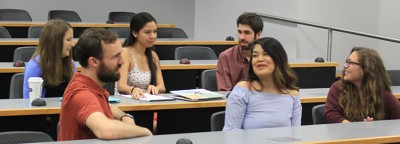 It was at this detention center that IJC encountered my primary client. "Ashur" (a fictitious name) is a Christian from Iraq, whose family had to flee the country after providing assistance to the American military following the 2003 invasion. Iraqi Christians are considered the indigenous people of Iraq, as they can trace their ancient communities back to the time of Jesus and still speak the modern form of his language, Aramaic. Unfortunately, the once-large population of Christians in Iraq has dwindled. Our client’s family was one of many that fled Iraq as refugees.
It was at this detention center that IJC encountered my primary client. "Ashur" (a fictitious name) is a Christian from Iraq, whose family had to flee the country after providing assistance to the American military following the 2003 invasion. Iraqi Christians are considered the indigenous people of Iraq, as they can trace their ancient communities back to the time of Jesus and still speak the modern form of his language, Aramaic. Unfortunately, the once-large population of Christians in Iraq has dwindled. Our client’s family was one of many that fled Iraq as refugees.
After the government began removal proceedings, IJC decided to take "Ashur's" case. Due to the continuing threat that ISIS poses to Christians in Iraq, we brought a claim for a withholding of his deportation under the Convention Against Torture. It was an incredible experience to write the brief, question our client as well as a witness in court, and deliver the closing statement. After spending all of 1L year learning legal theory and best writing practices, it was helpful to put it all to use in a real case. The IJC is a great opportunity for students to get real-life legal experience, and promotes the Law School’s Law-In-Action approach to learning. IJC was also a great opportunity for our client: we won his case, and the government chose not to appeal. Unless Iraq becomes substantially safer for Christians, he is no longer in danger of being deported.
Immigrant Justice Clinic Assists DACA Recipients
By Niabi Schmaltz, (2L)
This fall, the Immigrant Justice Clinic helped immigrants complete their DACA renewals. If their applications are approved, these individuals will be able to legally work and will receive deferred action from deportation for two years.
DACA (Deferred Action for Childhood Arrivals) was a program created by the Obama administration in 2012. Under the program, certain young, undocumented immigrants who had been brought to the United States as children could apply for a work permit and defer action from deportation. DACA recipients had to renew their application every two years to continue to benefit from the program.
On September 4, 2017, the Trump administration rescinded the DACA program. This decision means that nearly one million young immigrants will lose the protections previously afforded to them under DACA. Furthermore, the administration gave a very narrow window during which certain DACA recipients could renew their DACA benefits. The Immigrant Justice Clinic recognized that this window offered an important chance for qualifying DACA recipients to extend their benefits. The clinic pledged to offer pro bono support to DACA youth seeking renewal. Ultimately, members of the clinic were able to assist nine individuals complete and file their DACA renewals.
Margaret Raymond, Dean of the Law School, expressed her support for DACA youth and emphasized the unique role the legal community plays in this issue. "We are profoundly concerned about the fate of DACA youth in our community, and as lawyers we can do more than express our support: we can provide concrete legal guidance that helps them navigate the challenges ahead.”
Unfortunately, the future for DACA recipients is unknown. Even if the renewal application are approved, the protections will expire after two years. Ben Harville, the director of the Immigrant Justice Clinic, expressed his hope for a better future for DACA recipients. "I am hopeful that there will be a legislative solution to the rescission of DACA, perhaps one that includes a path to lawful permanent residence and U.S. citizenship. I truly believe that the majority of the American population recognizes that Dreamers are wonderful people who should be able to reside in the United States without fear of deportation."
When Dodecapodes Attack
By Aaron Bibb, (2L)
When I started at the Neighborhood Law Clinic (NLC) last June, I knew that I’d have the opportunity to work with a wide variety of areas of the law. What I didn’t know is that I’d be working with all of them in a single case. Our client, “Sydney” (a fictitious name), is an African-American woman with young children. She was subjected to racial abuse at her workplace, while she and her children were there as customers. She and other African-American employees protested her treatment and demanded that management do something about the situation, after which she was terminated.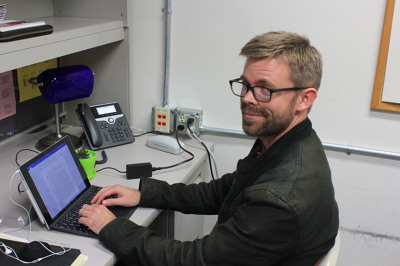
In the Neighborhood Law Clinic, we often nickname our cases. It’s a way of summing up the key issues in our cases, letting us talk about them in a kind of shorthand. We initially nicknamed this case the Octopus because it touched on so many legal areas and issues. However, we quickly realized that this case had far more than eight tentacles; thus, the Dodecapus was born.
Some of the Dodecapus’s tentacles were obvious enough; causes of action such as racial discrimination and retaliation didn’t take long to spot. Others quickly surfaced as we discussed the case within the NLC—for example, Sydney and her family were denied service on account of their race, violating city, state, and federal public accommodations law. But like any monster of the deep, the Dodecapus took its time in revealing its true nature. When Sydney and her African-American coworkers objected to her treatment—wasn’t that protected concerted activity under the National Labor Relations Act? And what about tort claims—intentional and negligent infliction of emotional distress? Maybe negligent hiring, training or supervision? Moreover, it was traumatic for Sydney’s children to witness their mother being treated like this—wouldn’t that create tort claims for them as well?
While we were analyzing the relative strengths of each of these causes of action, the Dodecapus threw a few barriers in our path. The employer might argue that Wisconsin’s worker’s compensation law, for example, precludes some of Sydney’s tort claims. Moreover, her employment relation was governed by a mandatory arbitration agreement, which the employer will almost certainly use to keep Sydney’s case out of court and in the more hostile environment of private arbitration.
That’s a lot to struggle with, and along with the constraints of classes, other clinic cases, and families, my case partner and I have had to manage our time carefully to avoid duplicating work or wasting effort. It’s required us to divide up our work carefully, to keep in close communication with one another, and to seek help—frequently—from our supervising attorney. But as second-year law students with an interest in employee-side employment law, we couldn’t have asked for a better case than Sydney’s. In just a few months, we’ve filed complaints and other documents with a municipal Equal Opportunities Commission and the National Labor Relations Board, and have thrown ourselves into numerous areas of employment and tort law. We’re helping Sydney achieve her goals of making her and her family whole for what they’ve suffered, and of preventing this from happening to other employees at her workplace. And we’re realizing that even the Dodecapus can be tamed.

